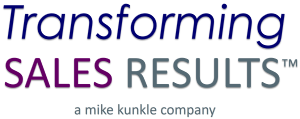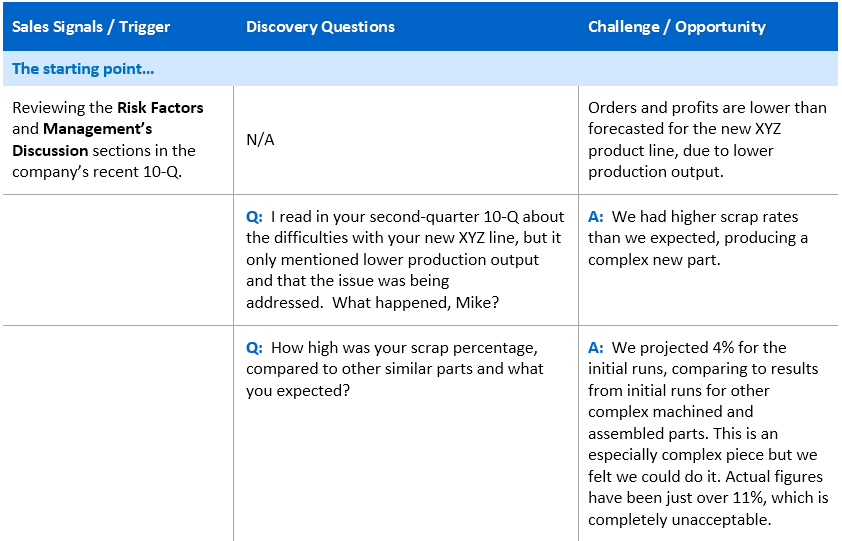The Untapped Power of Sales Discovery Skills
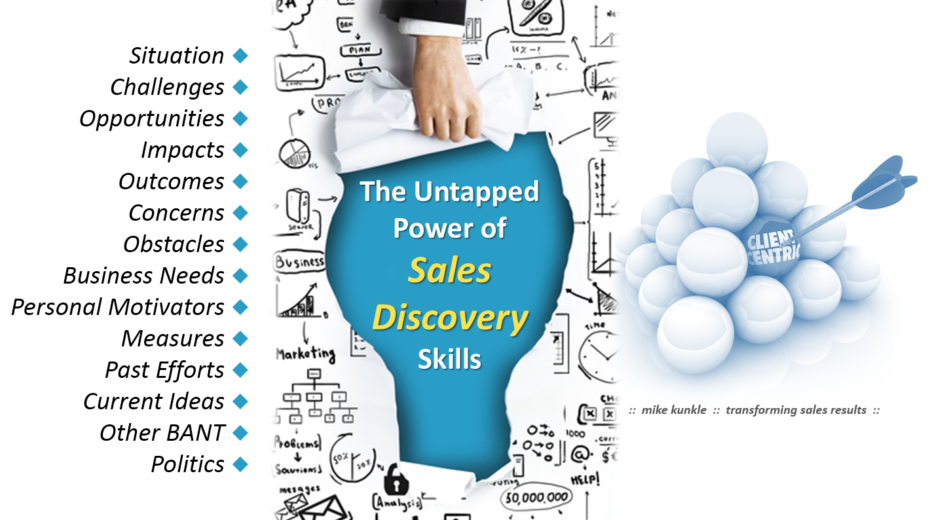
Some in the sales profession consider the act of discovering what is important to prospects or clients and understanding their challenges, opportunities, needs, and requirements to be the most basic skill in selling. After all, this is taught in every Sales 101-type course on the planet, right?
By contrast, to true top producers, Sales Discovery is a strategic thought process, a series of tactical skills, almost elevated to an art form. (I say “almost” purposefully – I get the point when people say high-level selling is an art, but I resist the art vs. science argument, since the skills are teachable, replicable, and coachable.)
So, on one hand, I agree that discovery seems basic, or perhaps at least foundational. Other than creating enough interest to have the dialogue in the first place, the practice of discovery is the foundation on which everything else builds.
The better you understand your buyer – their situation, challenges, opportunities, concerns, perspective, business needs, personal motivators, how they are measured, what they value, desired outcomes, their timeframe, budget, obstacles, political allies and detractors, and more – the better you can develop a solution that is relevant, compelling, and creates value.
We Still Have Big Skill Gaps
Sales Discovery methods are well-known and often written about, and considered “basic” by so many. Yet, I have seen:
- Almost an entire training class of sales pros with 3 to 30 years of experience, struggle in formulating good open questions during a class exercise.
- Seasoned sales pros completely move past the chance to dig deeper into something that was important to a prospective client, to quickly make a shallow recommendation.
- Sales pros (and classroom sales trainers) answering (what seemed to me to be) a clear question with the wrong information (based on poor listening and no communication check, before jumping to an answer).
- Sales pros attempting to pitch features and benefits before truly understanding the buyer’s issue and its impacts, and then having to navigate through every possible objection and concern, because they didn’t really understand the problem they were rushing to solve.
I wish I could say that the above scenarios are isolated outliers over my 25 years in the sales profession. They’re not.
I can speculate about human nature, psychology, about how poorly that sales training is implemented, how we don’t do enough field sales coaching, or about how easy it is for generally optimistic and confident sales people to over-estimate their skill levels. But in the end, I’m not 100 percent certain why we have this knowing-doing gap. I just know it exists. And, I know that when we acknowledge it and purposefully close it, our sales effectiveness increases dramatically.
While I have studied top sales producers for years (as discussed here), I want to be clear that I don’t have scientific evidence of this next statement – but I believe it to be true and have seen much anecdotal evidence of it:
Sales Discovery is a Big Performance Lever
“Improving the Sales Discovery Skills of average sales producers is the single biggest lever you can pull to improve their sales performance.”
 Yes, that statement is my opinion, and yes, it’s fraught with assumptions. If a rep can truly understand needs but doesn’t have a great product, or they can’t communicate or present a solution, or can’t negotiate or close…. there are certainly other inhibitors to performance that get in the way of sales growth. I’m just saying that if a rep is getting decent results (they’re average – middle of the pack), and does need improvement across the board, that this is one of the best places to start and typically offers big gains.
Yes, that statement is my opinion, and yes, it’s fraught with assumptions. If a rep can truly understand needs but doesn’t have a great product, or they can’t communicate or present a solution, or can’t negotiate or close…. there are certainly other inhibitors to performance that get in the way of sales growth. I’m just saying that if a rep is getting decent results (they’re average – middle of the pack), and does need improvement across the board, that this is one of the best places to start and typically offers big gains.
Why? I almost hate to put some of this in writing, but there are a few reasons:
- The basic human need to be understood is very powerful. It’s emotional, and people buy based on emotion as much or more as anything else. Logic and credibility support it, but don’t outweigh emotion in the decision process. Once again – thank you, Aristotle – the father of influence (ethos, pathos, logos).
- Understanding often leads to better relationships. Relationships won’t always outweigh other factors such as level of problem-solving ability, delivering insights, ability to communicate value, or cost/payback analysis – but all else being equal, relationship still wins. It’s a magnet.
- Through better discovery, the sales rep has a far higher chance of offering a solution that will truly help the buyer.
- Buyers often connect-the-dots themselves, about how a seller’s products or services solve their problems.
This last one makes me cringe to write, but it’s why so many sales are made DESPITE the sales rep, or when an average or below-average sales rep doesn’t have extraordinary skill (despite the oft-quoted insight that reps’ inability to communicate value is major deterrent to sales growth). I do believe the value-gap is true, by the way. I just also know that buyers often connect their own dots, once the need is clearly defined (and perhaps even more so, after the need is more deeply explored by the seller than, previously done by the buyer). Further, I don’t think the oft-cited value communication gap is always a communication problem. I think it’s a value-CREATION problem… which stems from the lack of a deep understanding of the buyer’s situation. Yup. A Discovery issue.
In short, there is great potential for sales performance improvement through better Discovery.
The Truth Is Out There (Mulder?)
Whether you call it Sales Discovery, Needs Dialogue, Uncovering Needs, Probing, Situation Assessment, or peeling the onion, it doesn’t matter.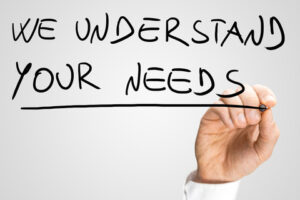
- In Professional Selling Skills, AchieveGlobal taught to uncover the What & Why behind each need (including the “Need Behind the Need”), and to uncover all the needs, and the priority of those needs.
- In Consultative Selling Skills, Richardson Sales Performance teaches their Six Critical Skills (good interpersonal communication skills) and the dialogue skills needed to deeply understand the buyers’ need.
- In SPIN Selling, Huthwaite taught how to use various questioning skills to define the Situation, Problem, Implications, and Needs Payoff.
- In Communispond’s Socratic Selling course, they teach the standard questioning and communication techniques but then offer an excellent “Line of Inquiry” to follow, to ensure you unearth the right stuff.
- In Modern Sales Foundations, at SPARXiQ, we teach a performance consulting model detailing the current state and desired future state, with a gap and impact analysis to create a compelling business case.
I could go on, but I’ll spare you. You get the idea.
I will go on record saying it doesn’t matter (as much) which questioning methodology you use. Yes, I have personal preferences, but what matters is that you actually get past the “knowing” and DO it.
- Have a strategy for what you want to learn (and remain flexible based on what you hear).
- Ask (primarily open questions, for discovery), listen, observe (if in person, or listen for voice inflection), summarize, confirm, and continue to ask deeper questions to peel the onion further, based on what you hear.
There are dozens if not hundreds of posts/articles and books out there about how to question effectively, many with detailed examples. I’ll offer additional posts in Related Reading, and because of that, won’t get incredibly detailed with examples here. I will offer a simple example and a format I’ve found helpful.
In the below diagram (under “Be Ready to Execute Tactically“), you’ll see:
- The Sales Signal or Trigger that prompted the sales approach.
- Example Discovery Questions
- A Challenge or Opportunity column with the C/O that the rep assumed to start, and the ongoing answers (in this same column) from the buyer.
Have a Plan
Even the best questions won’t be much help if you ask them haphazardly, just reading off a sheet of paper. You need a plan.
In terms of strategy, I’ve mentioned several things already that give you a general direction. You can explore:
- Situation / Circumstances
- Challenges (problems, issues, pain points) or Opportunities
- Impacts of the above, if not resolved or not obtained
- Desired outcomes
- Concerns (threats, worries, objections) and Obstacles in the way of resolution
- Resulting business needs
- Personal motivators, perspective, and what the buyer values
- How the buyer(s) are measured
- What they’ve tried or talked about already as possible solutions
- The rest of the old BANT stuff… timeframe, budget, decision-makers/authority
- Internal political allies and detractors
You’ll notice the similarity to the Customer Acumen/Solution Acumen graphic in this post on Insight Selling.
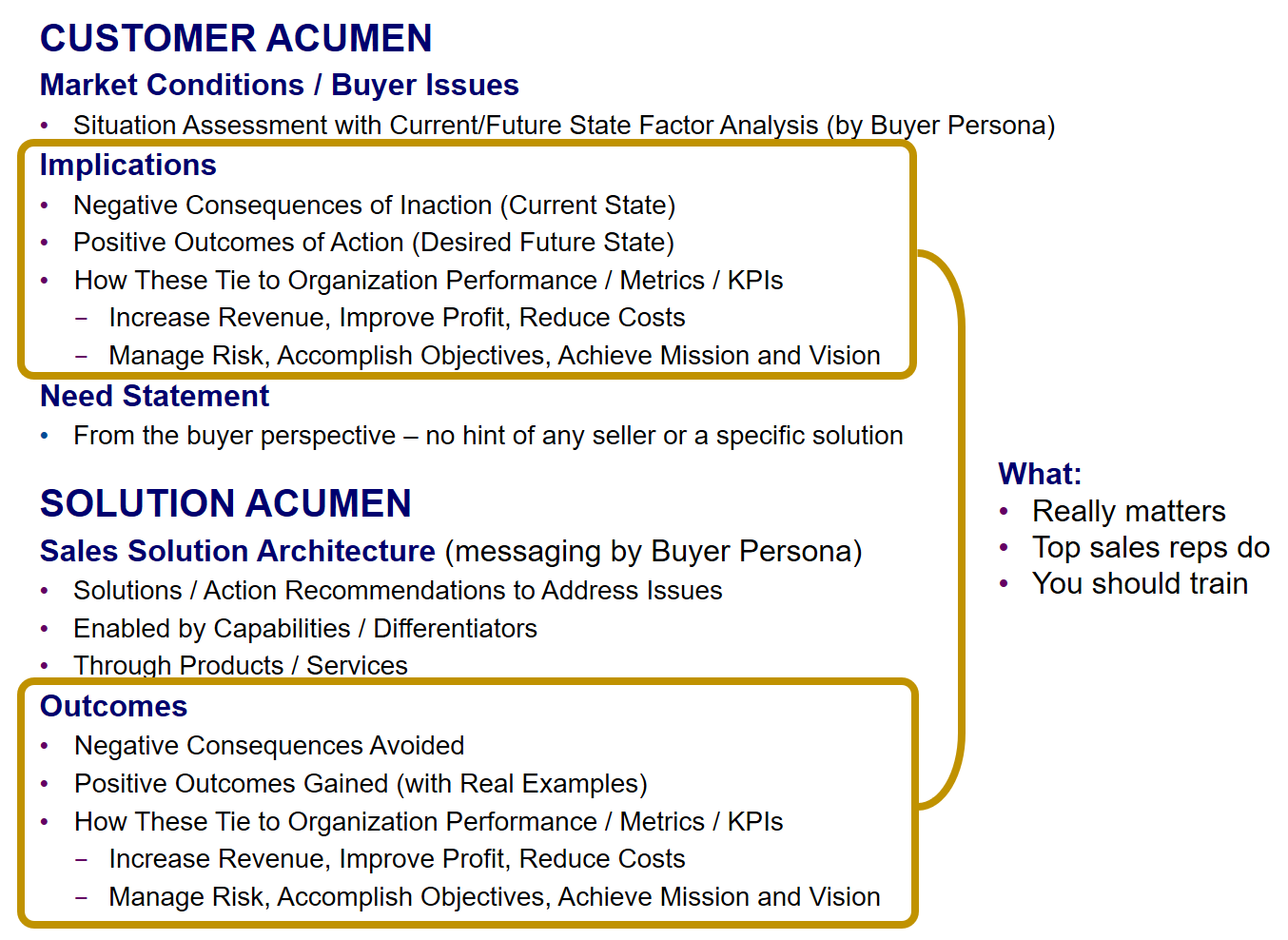 Connecting Implications and Outcomes is far more powerful than just discussing Needs and Benefits. To be able to do that, however, you first have to have the information – gained through your discovery process.
Connecting Implications and Outcomes is far more powerful than just discussing Needs and Benefits. To be able to do that, however, you first have to have the information – gained through your discovery process.
Be Ready to Execute Tactically
Here’s how it might start off…
Without detailing out an entire conversation, here are some follow-up questions and a path I’d already be considering, just based on this conversation so far.
Q: What is the impact of that gap, so far? (Can drill down into several “impact paths” to include financial, reputation, career/politics, and service).
Q: You mentioned initial runs of other similar complex parts have a scrap rate of 4%. How long is an “initial run” and where do the scrap rates tend to settle, for parts like this?
Q: What is the best outcome you hope to achieve? By when? (Are there others? Are they progressive?)
Q: What solutions have you considered?
- Likelihood of success?
- Risks?
- Cost/benefit?
And so on, drilling into the issue from multiple angles and understanding it as best you can.
My final question is usually something like:
Q: Mike, you’ve helped me get a very robust understanding of this situation and I appreciate that. Before I offer a final summary to ensure I truly understand what you’ve shared with me, what else, if anything, should I know or consider, that I haven’t thought to ask about?
When you’re peeling the prospect’s onion like this, you are likely to hear things in response to one question that can lead you down multiple paths. If you allow yourself to bounce around, the conversation will feel disjointed and attention-deficit, and may not uncover the depth you need about any one thing.
I suggest you take notes and put the things outside your current path in a particular format or in the margin. You can even say something like, “That sounds as if it will be important to consider, to fully resolve this issue. I want to hear more about XYZ and will come back to that in a moment [making a note], but let’s stay focused on ABC for now, so I understand this fully, first. Now… what else can you share about…?” [Going back to your original line of questioning]. This allows you acknowledge the additional information that was shared, cite is as important, and yet set it aside temporarily to stay focused on the drill-down on your initial topic.
Is there ever a time to veer off course, based on something new you just heard? Well, of course. At the end of the day, Judgment remains a Selling Superpower. There are no absolutes, but generally speaking, you’ll find the above advice to be sound.
Conversation Communication Tools/Methods
There isn’t anything magical here. These are just basic but often overlooked communication skills that when well used, can make your discovery process seem less like an interrogation and more like a natural conversation.
Observational: Say What You See/Hear. “I see (or saw) that…” or “I heard that…”
Summarizing: “So if I’m understanding correctly, you’re saying…” [Summarize without parroting]
Emotion Reflection: “You sound [insert emotion], Name, am I reading that right?”(Done well it helps convey and confirm emotions, but may carry some risk; it’s often safer to just ask, “How do you feel about that?”
Semantics/Assumption Checks: “Just to be sure I’m not making an assumption, when you use the phrase _______, what do you mean, exactly?”
Elaboration Phrases:
- Please explain.
- Can you elaborate on that?
- Tell me more.
- How so?
Replaying: They say that the ideas they’ve discussed internally are less-than-adequate. You just bounce back the part you want them to elaborate on. “Less-than-adequate?”
5 Ws + 1 H Meets Else and That
The 5 Ws are Who, What, Why When and Where. The H is How. Combined with Else or That, these become natural onion peelers.
5 Ws + 1 H and Else
- Who else?
- What else?
- Why else?
- How else?
- When else?
- Where else?
5 Ws + 1 H and That
- Who’s that?
- What’s that?
- Why’s that?
- How’s that?
- When’s that?
- Where’s that?
The Five Whys is also a great way to drill down. See this and this for more.
This certainly isn’t an inclusive list of communication methods, but should provide a starting point for fostering skills to make your discovery process less like “Twenty Questions” (even if they’re good open questions) and certainly avoid the feeling of interrogation. The idea is to mix and match, while you follow (and adjust) your strategy, to gain the full understanding you seek.
Intention Matters
From this post, I hope it’s obvious that I believe skills are very important, but as a big fan of the Franklin Covey book by Mahan Khalsa and Randy Illig, “Let’s Get Real or Let’s Not Play,” I also love the authors’ perspective that “intent counts more than technique.”
As you focus on improving your discovery skills this year and beyond, don’t be afraid to experiment and even make a mistake. If your intent is right, it counts for a lot and will be perceived by your buyers. A friend of mine is fond of saying that great leaders state their intent, and do so frequently. The same applies to great sales pros, or even just great communicators. Just please don’t use this as an excuse to NOT improve your discovery skills. Great skills PLUS your good intent with clear communication and aligned actions, becomes even more powerful.
On a side note, here’s a great interview with one of the Let’s Get Real authors, by my friend Charlie Green, of Trusted Advisor fame: http://trustedadvisor.com/trustmatters/trust-sales-and-getting-real-interview-with-author-mahan-khalsa
And with that, I’ll offer the below related reading, for those who want to dig in deeper, and close for today.
Related Reading:
- http://www.helpguide.org/articles/relationships/effective-communication.htm
- https://www.business.qld.gov.au/business/running/sales-customer-service/sales-skills/verbal-communication-skills
- http://blogs.richardson.com/2014/04/23/six-critical-skills-successful-sales-conversations/
- http://thesalesblog.com/blog/2010/03/01/4-ways-to-improve-your-communication-skills-for-sales/
- http://www.rainsalestraining.com/blog/the-power-of-why/
- http://customerthink.com/just_the_facts_sales_discovery_requires_more_than_asking_killer_questions/
- http://www.slideshare.net/Salesforce/sales-discovery-call-selling-on-the-phone
- http://partnersinexcellenceblog.com/theres-more-to-the-discovery-process-than-identifying-needs/
- http://asalesguy.com/2013/04/24/provoking-questions-vs-discovery-questions-how-to-get-your-customer-to-think-and-self-reflect/
- http://www.catalyticmanagement.com/articles/ten-reasons-why-discovery-questioning-is-the-key-to-closing-business
- http://www.saleseffectiveness.com/resources/articles-and-research/111-top-25-questions-to-explore-during-initial-sales-calls
- http://go.forcemanagement.com/blog/earn-the-right-to-ask-tough-questions-in-your-sales-discovery-process
- http://fearless-selling.ca/23-penetrating-sales-questions-you-need-to-start-asking/
- http://www.rainsalestraining.com/blog/21-powerful-open-ended-sales-questions/
- http://jackmalcolm.com/blog/2014/07/helpful-help-part-1/
- http://jackmalcolm.com/blog/2014/07/helpful-help-part-2-humble-inquiry/
- Special Note: Thanks to Jack Malcolm for this follow-up post to my original posting of this content on LinkedIn, highlighting the different between searching and exploring. True dialogue or exploration doesn’t have an agenda. It’s not bad per se to ask questions that lead toward your expertise (searching for a hit), but if you always have that slanted agenda, you may miss the substance and nuance in the customer’s situation, that could give you a real edge in understanding, and ultimately, in winning the business. Thanks Jack. Well said: http://jackmalcolm.com/blog/2014/12/sales-discovery-why-you-need-to-do-more-exploring-and-less-searching/
I hope I’ve given you some food for thought about sharpening your discovery skills saw, and a few tools to help. This is what I think, but more importantly… What do YOU think?
I look forward to your thoughts, opinions, and experiences.
Thanks for reading, be safe out there, and by all means… let’s continue to elevate our sales profession.
Mike
Follow my work and connect:
- SPARXiQ Blog: https://sparxiq.com/author/mikekunkle
- The Building Blocks of Sales Enablement Book: https://bit.ly/BBofSE
- Sales Effectiveness Straight Talk Webinars: https://bit.ly/MikeKunkle-OnDemand (60 Free Recorded Webinars)
- Mike’s LinkedIn Articles: http://bit.ly/MK-LinkedInArticles
- Mike’s LinkedIn Profile: https://www.linkedin.com/in/mikekunkle
- Mike on Twitter: https://twitter.com/mike_kunkle
About Mike
Mike Kunkle is a recognized expert on sales training, sales effectiveness, and sales enablement. He’s spent over 27 years helping companies drive dramatic revenue growth through best-in-class training strategies and proven-effective sales transformation systems – and he’s delivered impressive results for both employers and clients. Mike is the founder of Transforming Sales Results, LLC and works as the Vice President of Sales Effectiveness Services for SPARXiQ, where he designs sales training, delivers workshops, and helps clients improve sales results through a variety of sales effectiveness services. Mike collaborated with Doug Wyatt to develop SPARXiQ’s Modern Sales Foundations™ curriculum and also authored the SPARXiQ’s Sales Coaching Excellence™ course. His book, The Building Blocks of Sales Enablement, is available on Amazon.
